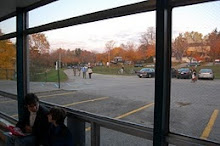 The economy has been in the news a lot lately. GDP growth is slightly lower than average. Unemployment is slightly above normal structural unemployment. The news coverage, however, often incorrectly says the economy is in trouble.
The economy has been in the news a lot lately. GDP growth is slightly lower than average. Unemployment is slightly above normal structural unemployment. The news coverage, however, often incorrectly says the economy is in trouble.Even worse, some coverage of this non-problem suggests it’s the main issue in the presidential election. No one can do anything to stop the economic cycle of expansion and contraction or the quarter-to-quarter ups-and-downs of markets. Nevertheless this is the stuff that politicians and media talk about.
One reason for the perception that things are worse than they are is that the problems are narrowly concentrated in areas where people turn for safety. Usually when the economy contracts or stagnates, investments in growth industries are most affected. If it’s bad enough, it can spill over into normally stable areas and depress real estate prices and cause bank failures. The present situation is reverse. The areas that people thought were safe, i.e. mortgage backed securities and real estate, have been hurt while the rest of the economy does okay. This situation is psychologically worse than in 2000-2002 when the tech bubble deflated. In that bubble, people seeking high risk/return suffered losses. In the RE bust, people seeking safety suffered losses.
Another reason is that too many people are living on the edge counting on most things to work out in their favor. When the inevitable sickness, emergency, contraction in GDP, or whatever comes, it’s a crisis that demands a government response. This way of thinking is bad on many levels.
- It takes valuable time away from issues that the government actually can do something about.
- It makes people feel dependent on the government.
- The government doesn’t do as good a job as people looking out for themselves.
- No matter how good the government is, there will always be ups-and-downs in life. Not planning ahead always results in problems.


No comments:
Post a Comment